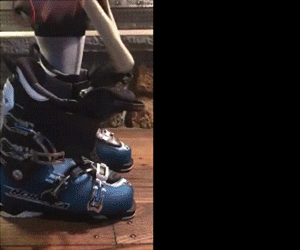skigrl27
Ski Diva Extraordinaire<br>Legal & Environmental A
So maybe some of you knee injury experts can advise...
My right knee (after a big day at Mad River Glen 3 seasons ago) has always made a kind of "crunching" noise. Going up stairs, bending down, etc, etc. Crunch, crunch, crunch.
Last season, before skiing started, I decided to get it checked out my an Orthopoedist. They X-rayed and looked and said it was nothing - but that I would likely have arthritis in that knee as I got older.
Well, after our first HUGE powder weekend, last night, I got home and my knee swelled slightly and is VERY stiff. And it just simply hurts. Something is definitley not right. It doesn't hurt when I ski, just walking and extending...kind of strange. My ski stance feels fine and I got through the whole weekend charging pretty hard. It's hard to pin point where the pain is - but mostly on the inside sort of under my knee cap. Ugh.
I'm going tomorrow morning back to the same doctor to get it re-checked. I'm so afraid of what they may say. I will be devastated if I they advise me not to ski - I would probably break out in tears right there in their office.
I'm definitely stressing about the check up tomorrow.
My right knee (after a big day at Mad River Glen 3 seasons ago) has always made a kind of "crunching" noise. Going up stairs, bending down, etc, etc. Crunch, crunch, crunch.
Last season, before skiing started, I decided to get it checked out my an Orthopoedist. They X-rayed and looked and said it was nothing - but that I would likely have arthritis in that knee as I got older.
Well, after our first HUGE powder weekend, last night, I got home and my knee swelled slightly and is VERY stiff. And it just simply hurts. Something is definitley not right. It doesn't hurt when I ski, just walking and extending...kind of strange. My ski stance feels fine and I got through the whole weekend charging pretty hard. It's hard to pin point where the pain is - but mostly on the inside sort of under my knee cap. Ugh.

I'm going tomorrow morning back to the same doctor to get it re-checked. I'm so afraid of what they may say. I will be devastated if I they advise me not to ski - I would probably break out in tears right there in their office.
I'm definitely stressing about the check up tomorrow.

 If patella, there is a ton that pt can accomplish. Have to be regular with mine, though, even in off-season, or things want to go back to their "old, familiar" (and INCORRECT) position.
If patella, there is a ton that pt can accomplish. Have to be regular with mine, though, even in off-season, or things want to go back to their "old, familiar" (and INCORRECT) position.  We're nosy!
We're nosy!